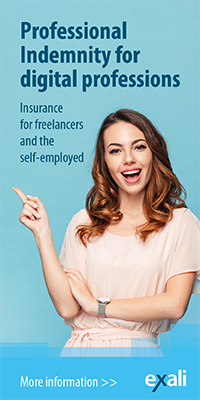Self-employed as a blogger: From a concept to a successful business
A successful blogging business means more than just writing exciting texts on your laptop. Read the article to find out how to find your niche, take the first practical steps and ensure you have the right coverage.
Becoming a self-employed blogger – a good idea?
For many, blogging independently sounds like a dream come true: creativity, exciting topics and lots of freedom. However, you also need a lot of perseverance to succeed. It takes time, work and a willingness to constantly adapt your concept until you achieve the visibility you need to make a living from your business.
Step 1: Find your topic
Think about the topics you want to cover. You need to be seen as an expert if you want to build up a loyal readership in the long term. Stay authentic and you'll have a good chance of getting people excited about your stuff. High-quality content, regular posts and a good presentation are essential for getting lots of traffic.
Step 2: Create a clear plan
Blogging is also a business. Accordingly, you should not approach your project from a purely creative angle. You should also ask yourself the classic start-up questions, such as:
- How do you stand out from the competition?
- How do you generate revenue?
- Where does your readership come from?
- What legal requirements do you have to comply with?
This list is by no means complete. In the article Creating a Business Plan: This Is What You Need To Include, you can read about how to create a comprehensive business plan.
Step 3: Comply with the law and don't forget coverage
Even if you can get started as a blogger without any major obstacles, there are a few things you need to bear in mind if you are running a business. Here is a selection:
Commercial blogs are subject to the legal notice requirement.
Copyright law also plays an important role for you. As a blogger, you use content every day – and that comes with a number of legal pitfalls. To minimise the risk of expensive claims for compensation, we recommend the article The 5 Most Common Infringements and how to Avoid them.
If you intend to make a profit with your blog, it is better to register a business and pay taxes as soon as possible. This also applies if you are only running your blog as a side business.
Like any business, blogging also involves risks. With Professional Indemnity Insurance through exali, you are covered against the consequences of professional mistakes. It is also worth taking out coverage against cyber risks. In addition to Professional Indemnity Insurance, you can protect yourself against the dangers of hacker attacks with the Add-on for First-Party Cyber and Data Risks Insurance (FPC).
Step 4: Implement your plan
Starting your own blog is easy, but to make it profitable in the long term, you should draw up a financial plan. There are various ways to earn money with your blog.
Collaborations
Whether you're testing products, posting shoutouts or collaborating with other bloggers on content, long-term partnerships are worth it! They increase your reach, attract new target groups and generate more sales. Read on to find out what matters when it comes to content partnerships: Content Collaborations: Opportunities and Risks for Site Operators and Bloggers.
Online Advertising
As a blogger, you can also earn money with classic banner advertising. You can place different formats in different places on your site. How much this form of advertising pays off depends on click rates, traffic, the offer of the advertisers, but also on your own popularity.
Affiliate Marketing
The concept is simple: You publish an article on a specific topic on your blog. You add links to the corresponding offer within the content. If someone clicks on the link and makes a purchase, you receive a commission from the shop. Choose your affiliate partnerships carefully and make sure that the content fits the focus of your blog.
Sale of services and products
Once you have built up a certain reputation with your blog, you can expand your offer. For example, you can offer your own services in the form of webinars, eBooks or your own shop.
Step 5: Create reach
You need to generate reach with your blog – otherwise monetisation will be difficult. Here are a few possibilities:
Networking
Network with other members of the blogging community. Read their posts, comment on them and exchange ideas. Whether it's an analogue networking event or a digital conference, there are many options for making new contacts.
Tools and programmes
In addition to a solid network, there are also plenty of tools available to help you increase your reach.
- SEO optimisation plays an important role. After all, you want your texts to rank as high as possible on Google. The Google Keyword Planner or WordPress plugins such as Yoast SEO help you optimise your posts for the right keywords.
- To ensure you never run out of ideas, you can use tools like Buzzsumo.
- If a newsletter is part of your marketing activities, you can measure its success using tools such as MailChimp or GetResponse.
- Sprout Social or Hootsuite support you in your social media activities. Here you can plan posts and measure their success.
- If you want your blog to grow, you need to know how your website is performing. Google Analytics is the perfect tool for this. It tells you where your readers come from, which articles are particularly popular and where you can make improvements.
- Google Adsense can help you monetise your blog. It allows you to integrate advertisements from other companies on your website.
Becoming a self-employed blogger: freedom and responsibility
If you want to earn money with your blog, you need to diversify: you not only need creativity and comprehensive knowledge in your field, but you also have to acquire marketing skills, be familiar with legal requirements and generate sufficient reach. Think like an entrepreneur, become a professional in your field and remain authentic – then you are sure to gain a loyal readership.

Vivien Gebhardt is an online editor at exali. She creates content on topics that are of interest to self-employed people, freelancers and entrepreneurs. Her specialties are risks in e-commerce, legal topics and claims that have happened to exali insured freelancers.
She has been a freelance copywriter herself since 2021 and therefore knows from experience what the target group is concerned about.








